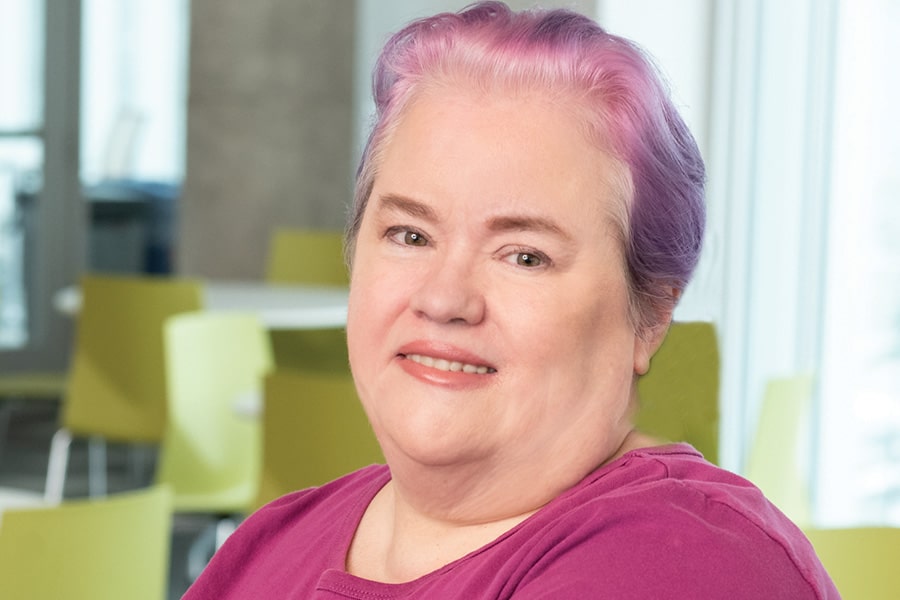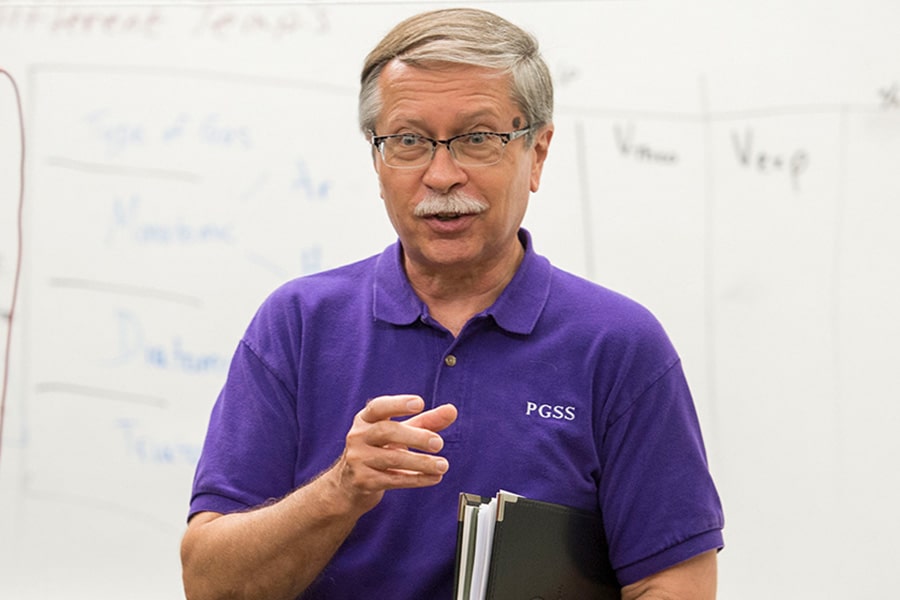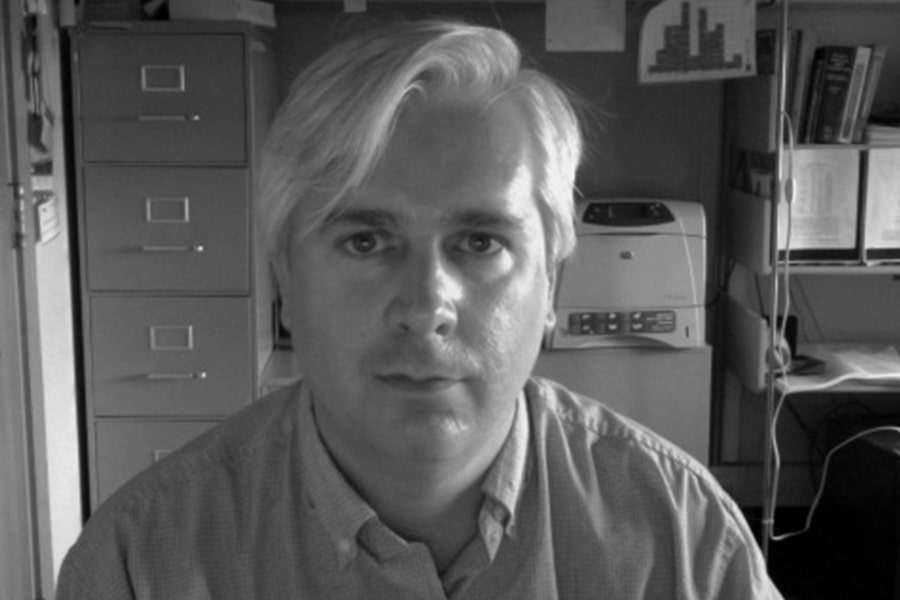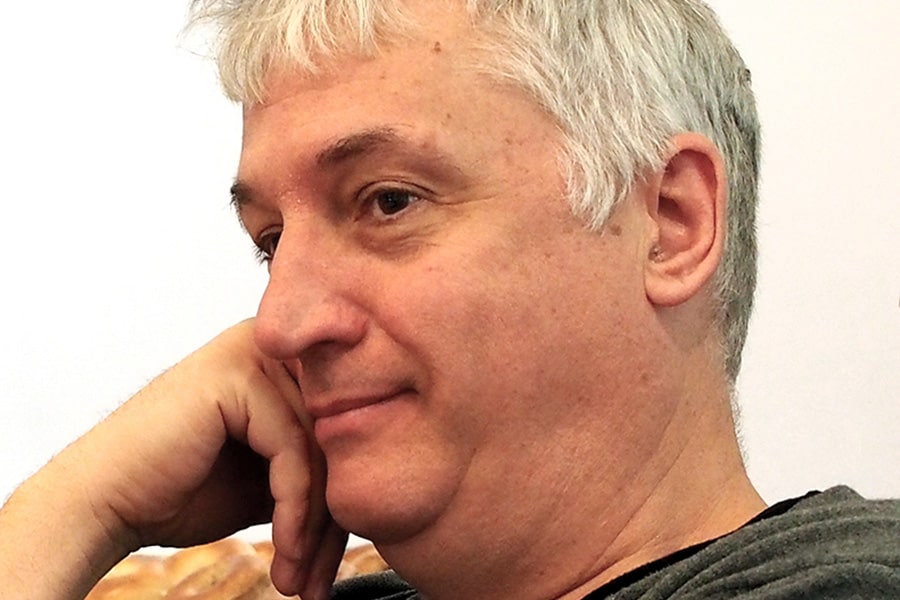July 30, 2020
This is real life. And the stuff of science fiction. The similarities are clear for those who embrace the genre.
“As a fan, writer, editor and instructor of science fiction, I've already considered this scenario, along with a zombie apocalypse, alien invasions and other global disruptions,” said Diane Turnshek, a special lecturer and astronomer in Carnegie Mellon University’s Mellon College of Science. “Granted, there's no comparison between the tension levels of colonists, for example, fighting for their lives against an incoming meteor swarm and many of us, snacking on the couch watching Netflix.”
Turnshek is one of a number of science fiction fans within the Carnegie Mellon community who find themselves living through a “science-fictional moment” created by COVID-19. Barb Carlson is another. She’s worked in the Tepper School of Business for nearly 35 years.
When she’s not serving as a senior academic coordinator, she’s often at home with her head in a science fiction story, reading five books at a time — one upstairs, another downstairs, something on the computer, a book on her Kindle and a fifth on her phone. Carlson’s been reading and dreaming about unique scenarios since she was nine years old.
“I was waiting for the aliens to show up or learning about life on other planets. I wasn’t really interested in living through a pandemic,” said Carlson, who helped establish Parsec, Pittsburgh’s most prominent science fiction and fantasy organization, 35 years ago. “Science fiction fans have already read about these scenarios. Many of us hear about sheltering-in-place and say ‘I got this!’ It’s like living alone in a spaceship. You just have to make sure you have enough food.”
While CMU doesn’t have a minor, major or academic track devoted to science fiction, it does have a few courses tied to the genre. Barry Luokkala has taught “Science and Science Fiction” in the Mellon College of Science for the last 20 years. He focuses on several of the main themes repeatedly posed in movies, TV and books, including the nature of time and space and using science and technology to solve humanity’s issues.
He lectures each spring about the 2011 movie “Contagion” and its tie to what it means to be human. The film is about a deadly, worldwide outbreak of a fatal disease. When teaching about it in mid-April, Luokkala made the lesson optional out of respect for students who may have found it disturbing because of the movie’s similarity to the coronavirus.
“After watching clips from the movie, I presented actual data on the spread of COVID-19 and compared to the details in the film,” said Luokkala, a teaching professor in the Department of Physics. “The scenario in ‘Contagion’ could almost be thought of as predicting what we're going through at the present time. Most of my regular students attended, and it sparked a good conversation about herd immunity.”
Peter Freeman and Tom Werner are teaching professors in CMU’s Dietrich College of Humanities and Social Sciences. The duo taught “Grand Challenge Freshman Seminar: Beyond Earth“ during the spring semester. Students contemplated journeys to other planets and life on them, with the requirement of contemplating and adhering to scientific realities. A final project was writing a 15-page sci-fi story.
“When we switched to remote teaching midway through the term, I thought about Peter’s lectures early in the semester about space travel,” said Werner, who studies linguistics in the Department of Philosophy. “If we’re ever going to get anywhere outside our solar system, it will be on inter-generational starships, stuck with the same people. That sounded a lot like being stuck at home during the pandemic.”
“We know virtually nothing about life on other planets, and when you don’t have the facts, you fill it in with imagination,” said Freeman, an astrostatistician in the Department of Statistics who develops and applies data analysis methods for astronomical datasets. “We challenged our students to consider what’s known scientifically and fill in the gaps with creativity, while respecting the realities of science.”
It’s an outlook echoed by Turnshek, who once spent weeks isolated with five others in southern Utah at the Mars Desert Research Station. She learned the importance of routines and taking care of yourself when normal life is interrupted, as well as the need for imagination.
“I highly recommend reading science fiction as a relief from these confining four walls,” Turnshek said. “Explore! Expand that sense of wonder with otherworldly conflicts and breathless adventures. Leave this planet for a whirlwind tale of struggle, and when you return, your slightly chipped teacup, unmade bed and comfy couch will look glorious by comparison.”
Science Fiction During a Science-Fictional Moment
A deadly virus rages around the world, emptying workplaces, restaurants and movie theaters. After weeks and months in isolation, civilization begins to emerge. Many of those venturing outdoors continue to wear masks, hoping to slow the spread of the pandemic.This is real life. And the stuff of science fiction. The similarities are clear for those who embrace the genre.
“As a fan, writer, editor and instructor of science fiction, I've already considered this scenario, along with a zombie apocalypse, alien invasions and other global disruptions,” said Diane Turnshek, a special lecturer and astronomer in Carnegie Mellon University’s Mellon College of Science. “Granted, there's no comparison between the tension levels of colonists, for example, fighting for their lives against an incoming meteor swarm and many of us, snacking on the couch watching Netflix.”
Turnshek is one of a number of science fiction fans within the Carnegie Mellon community who find themselves living through a “science-fictional moment” created by COVID-19. Barb Carlson is another. She’s worked in the Tepper School of Business for nearly 35 years.
When she’s not serving as a senior academic coordinator, she’s often at home with her head in a science fiction story, reading five books at a time — one upstairs, another downstairs, something on the computer, a book on her Kindle and a fifth on her phone. Carlson’s been reading and dreaming about unique scenarios since she was nine years old.
“I was waiting for the aliens to show up or learning about life on other planets. I wasn’t really interested in living through a pandemic,” said Carlson, who helped establish Parsec, Pittsburgh’s most prominent science fiction and fantasy organization, 35 years ago. “Science fiction fans have already read about these scenarios. Many of us hear about sheltering-in-place and say ‘I got this!’ It’s like living alone in a spaceship. You just have to make sure you have enough food.”
While CMU doesn’t have a minor, major or academic track devoted to science fiction, it does have a few courses tied to the genre. Barry Luokkala has taught “Science and Science Fiction” in the Mellon College of Science for the last 20 years. He focuses on several of the main themes repeatedly posed in movies, TV and books, including the nature of time and space and using science and technology to solve humanity’s issues.
He lectures each spring about the 2011 movie “Contagion” and its tie to what it means to be human. The film is about a deadly, worldwide outbreak of a fatal disease. When teaching about it in mid-April, Luokkala made the lesson optional out of respect for students who may have found it disturbing because of the movie’s similarity to the coronavirus.
“After watching clips from the movie, I presented actual data on the spread of COVID-19 and compared to the details in the film,” said Luokkala, a teaching professor in the Department of Physics. “The scenario in ‘Contagion’ could almost be thought of as predicting what we're going through at the present time. Most of my regular students attended, and it sparked a good conversation about herd immunity.”
Peter Freeman and Tom Werner are teaching professors in CMU’s Dietrich College of Humanities and Social Sciences. The duo taught “Grand Challenge Freshman Seminar: Beyond Earth“ during the spring semester. Students contemplated journeys to other planets and life on them, with the requirement of contemplating and adhering to scientific realities. A final project was writing a 15-page sci-fi story.
“When we switched to remote teaching midway through the term, I thought about Peter’s lectures early in the semester about space travel,” said Werner, who studies linguistics in the Department of Philosophy. “If we’re ever going to get anywhere outside our solar system, it will be on inter-generational starships, stuck with the same people. That sounded a lot like being stuck at home during the pandemic.”
“We know virtually nothing about life on other planets, and when you don’t have the facts, you fill it in with imagination,” said Freeman, an astrostatistician in the Department of Statistics who develops and applies data analysis methods for astronomical datasets. “We challenged our students to consider what’s known scientifically and fill in the gaps with creativity, while respecting the realities of science.”
It’s an outlook echoed by Turnshek, who once spent weeks isolated with five others in southern Utah at the Mars Desert Research Station. She learned the importance of routines and taking care of yourself when normal life is interrupted, as well as the need for imagination.
“I highly recommend reading science fiction as a relief from these confining four walls,” Turnshek said. “Explore! Expand that sense of wonder with otherworldly conflicts and breathless adventures. Leave this planet for a whirlwind tale of struggle, and when you return, your slightly chipped teacup, unmade bed and comfy couch will look glorious by comparison.”




